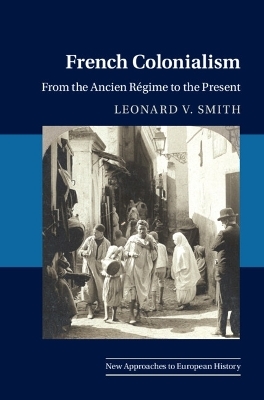
French Colonialism
From the Ancien Régime to the Present
Seiten
2023
Cambridge University Press (Verlag)
978-1-108-79915-7 (ISBN)
Cambridge University Press (Verlag)
978-1-108-79915-7 (ISBN)
Over more than four centuries, the French empire explained itself in many different ways through many different colonial regimes. This narrative history recounts the unique origins and purposes of the French empire, through to the numberless traces that remain both in the former colonies and in today's French Republic.
France had the second largest empire in the world after Britain, but one with very different origins and purposes. Over more than four centuries, the French empire explained itself in many different ways through many different colonial regimes. Beginning in the early modern period, a vast mercantile empire based on furs and fish in the New World and sugar cultivated by the enslaved in the Caribbean rose and fell. At intervals thereafter, the French seemed to have an empire simply as an attribute of a Great Power, generally in competition with Britain. Relatively few French people ever moved to the empire, even to the settler colony of Algeria. Under the Third Republic, the French construed a “civilizing mission” melding selectively applied principles of democracy and colonial capitalism. Two world wars and two anticolonial wars broke French imperial power as it had previously existed, yet numberless traces of the French empire lived on, both in the former colonies and in today's French Republic. This narrative history recounts the unique course of the French empire, questioning how it made sense to the people who ruled it, lived under it, and fought against it.
France had the second largest empire in the world after Britain, but one with very different origins and purposes. Over more than four centuries, the French empire explained itself in many different ways through many different colonial regimes. Beginning in the early modern period, a vast mercantile empire based on furs and fish in the New World and sugar cultivated by the enslaved in the Caribbean rose and fell. At intervals thereafter, the French seemed to have an empire simply as an attribute of a Great Power, generally in competition with Britain. Relatively few French people ever moved to the empire, even to the settler colony of Algeria. Under the Third Republic, the French construed a “civilizing mission” melding selectively applied principles of democracy and colonial capitalism. Two world wars and two anticolonial wars broke French imperial power as it had previously existed, yet numberless traces of the French empire lived on, both in the former colonies and in today's French Republic. This narrative history recounts the unique course of the French empire, questioning how it made sense to the people who ruled it, lived under it, and fought against it.
Leonard V. Smith is the Frederick B. Artz Professor of History at Oberlin College, Ohio. He has written four previous books, most recently Sovereignty at the Paris Peace Conference of 1919 (2018).
Introduction: why did France have an empire?; 1. The rise and fall of the Mercantilist Empire; 2. Reinventions of the empire in the 19th century; 3. The Mission Civilsatrice to 1914; 4. Empire and the world wars: 1914–1945; 5. Decolonization: 1945–1962; 6. The empire after the empire: 1962–present.
| Erscheinungsdatum | 27.06.2023 |
|---|---|
| Reihe/Serie | New Approaches to European History |
| Zusatzinfo | Worked examples or Exercises |
| Verlagsort | Cambridge |
| Sprache | englisch |
| Maße | 151 x 229 mm |
| Gewicht | 369 g |
| Themenwelt | Geisteswissenschaften ► Geschichte ► Regional- / Ländergeschichte |
| Geschichte ► Teilgebiete der Geschichte ► Wirtschaftsgeschichte | |
| ISBN-10 | 1-108-79915-9 / 1108799159 |
| ISBN-13 | 978-1-108-79915-7 / 9781108799157 |
| Zustand | Neuware |
| Haben Sie eine Frage zum Produkt? |
Mehr entdecken
aus dem Bereich
aus dem Bereich


